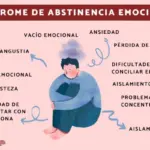
Heartbreak is a psychological state that perhaps we ourselves and even anyone around us has experienced at some point in their lives. Each person manifests it in a different way, therefore, there are individuals who go through the process in a pleasant and bearable way, and others who experience it with a lot of pain, anguish and frustration that become comparable to the loss of a loved one.
Heartbreak can be described as an intense emotion that appears when a relationship ends. We are talking about a necessary separation to be able to face a new future without that person. It is evident that this situation generates a significant emotional impact since the life that had been idealized with the partner collapses and becomes a mere memory or imagination.
In this regard, it is vital to highlight that heartbreak is not only experienced by those who try to form an idyllic future with their love, but that this psychological state is also experienced by those who realize that they are no longer in love and decide to end the relationship. To understand it well, heartbreak appears when the couple encounters an obstacle between the expectations created in the past about common objectives, both in the short and long term, and the present where these expectations have already lost their reason for being and are no longer valid. viable.
Psychological effects of heartbreak
As we mentioned at the beginning, losing someone we love leaves an emotional wound that we must heal and heal. Psychological experts say that we need to go through a grieving process, as if it were an approaching death. It is important to respect each other’s times, without judging or shaming us. Although each person has their own way of grieving, there are 4 common stages that we will explain below:
1. The shock
The first hours, days and even weeks after a breakup are characterized by emotional shock. In this stage, The phrase “I can’t believe it” is used a lot. And this is indeed it. The person cannot get the idea of what has happened. It may be difficult to sleep, or even do activities that you previously enjoyed. Fear of separation is also common in this initial stage and this is when many desperately try to regain contact. Therefore, it is important to surround ourselves with people who give us security and not make great efforts to go out. It is also not a good time to make decisions since we are biased by our feelings.
2. Denial
When you leave a relationship, you may not get used to the idea, you still have some hope of returning to that person, and ultimately, you feel hooked on that love. It is a stage in which the individual is not experiencing the deep emotions of the breakup. It’s like he doesn’t accept reality and it even seems like he’s wasting his time. It is a vital moment and must be respected and understood. Denial is like a defense mechanism that allows us to move forward with our lives, without letting ourselves be overwhelmed by the initial shock.
3. Emotions
When a few months pass and the affected individual thinks that he has overcome the breakup, it is common for all the emotions related to memories of love to return. It is a confusing stage, however it is extremely important to overcome the breakup. Each person experiences it in their own way. Some feel anger, disgust, even rejection towards their former love. In contrast, others feel nostalgia for what was lost and what could have been. It is also a moment in which the person begins to feel afraid for not always wanting to feel this way.
4. Recovery
Finally, we manage to be at peace with the lost relationship and this allows us to have a more objective and adult view of what happened. It is a process of reflection and assimilation where we take the mistakes and successes of the past relationship to improve in the future. It is when little by little you begin to rebuild your life, you open yourself to the world again and you manage to be calm with yourself and your surroundings.
5. Brain and heartbreak
The pain and grief that we have explained above is not a simple perception or idea, but an objective and physical sensation that implies powerful changes at the brain level. It is interesting to highlight the research that exists about the connection between certain brain areas and the psychological emotion of heartbreak.
It is known that romantic love triggers the levels of three neurotransmitters in particular: dopamine, serotonin and oxytocin. The first is related to anticipation and reward, therefore, it makes the desire to be with the loved one become an addiction and obsession, just as happens with drugs, gambling and even chocolate. Serotonin is related to a good mood, happiness and general well-being. Finally, oxytocin unites us with the loved one since it is directly related to pleasure and affection. This helps the brain to feel affection and, in general, love for the loved one.
Going one step further, in recent research they studied the brains of both men and women who had just ended a romantic relationship. As expected, the brain regions that were most active were the same ones that become hyperactivated in pathological gambling when big wins or big losses occur. Not only this, but activity increased in those brain regions related to obsessive and aggressive behaviors.
Therefore, it is portrayed that when a rupture occurs, the levels of these neurotransmitters plummet. As if this were not enough, the simple threat of losing the person you love causes the levels of these neurotransmitters to drop, causing stress, anxiety and even depression. Therefore, it is not strange that a high percentage of people suffer from anxious or depressive symptoms after a divorce and that many even need psychological help after a romantic breakup.
How does psychotherapy help for heartbreak?
There can be many reasons why a person decides to go to therapy to manage the feelings that bloom after a heartbreak. The person may feel that they do not have adequate support in their environment, they do not feel heard or understood by the people around them, or even because they have become hooked on that old love and cannot manage their emotions correctly.
Psychotherapy offers ideal support and accompaniment from psychology professionals, specialized in breakups and grief. With this, the affected person feels understood, listened to and cared for, since the therapist knows what is happening and has the ability to guide the person towards improvement. It must be taken into account that the therapist is a professional with studies and training to help specifically in these cases.
Besides, Through emotional therapy, psychotherapy trains emotional intelligence so that the person can manage their own emotions, thus reducing stress, anxiety and harmful emotions. In therapy, the invalidating feelings that arise after a breakup are worked on. For example, “I’m never going to get over it,” “it’s been a long time and I’m still thinking about this, I’m stupid,” “I should have gotten over it by now,” are some of the limiting phrases that prevent a person from living a full and fulfilling life. quality. Therefore, working on these ideas in therapy is essential.
Professionals also help design and reorganize a life plan. They are an accompaniment and guide in making healthy decisions for the person, since they encourage them to undertake those personal projects that are important and motivate. Finally, psychotherapy also helps to resolve any other issue related to personality, experiences, that the individual wishes to fix to achieve that personal well-being that we so long for. In short, many times we go to therapy for one main reason and with the passage of time, we realize that in reality, we have a deep uninhabited world that prevents us from progressing and professional help is non-negotiable.








